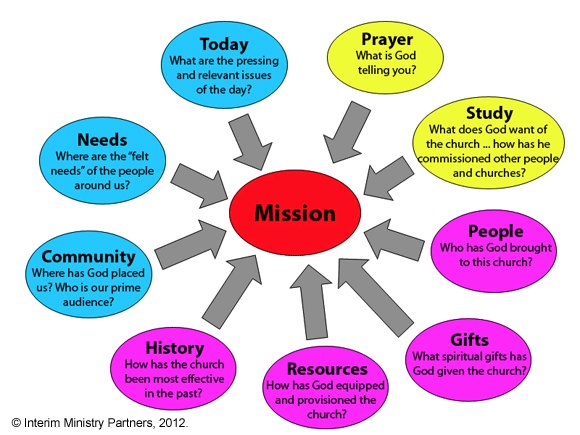"What in the world are we supposed to do? Our leaders seem to lack vision?" These words poured out of a church member frustrated at not seeing any real central purpose in all the many activities going on in their church. Their underlying question was simple: "What's our mission?"
Mission clearly articulates what a congregation feels called by God to do - given the surrounding culture, time in history, the experience and giftedness of the congregation's members, and the opportunities and challenges of its surrounding community. Mission provides a spiritual target that helps align a congregation's activities: "This is what we must do to be Jesus' bodily presence in our community!" The ministries of the congregation, the way it spends its money, the things a congregation talks about most in its publications, and the focus of a healthy congregation's attention all cluster around this sense of mission. It is mission that moves the congregation from slogans to service, from banners to baptisms, and from killing time to kingdom living.
As we look at the "Determining our Mission" diagram,1 notice that one of the crucial elements to examine involves the "realities of our community" - those needs, hurts, and opportunities evidenced by the neighbors God has given us.
The Bible helps us understand how the surrounding community can highlight our unique mission as a church. Whether we look at different congregations in the book of Acts (for example Jerusalem, Antioch, Ephesus, or Rome) or study the "Seven Churches of Asia" in the book of Revelation, or survey the different churches addressed by Paul in the New Testament letters, it is clear that each has a slightly different mission, a unique and peculiar calling.
Why? Isn't the mission of all churches the same? After all, every congregation lives under the same two great commands to love God and neighbor (Matthew 22:36-40). All churches are called to fulfill Jesus' Great Commission (Matthew 28:18-20). So why would the mission of each congregation be different?
The answer is simple. In fact, you probably know it. The way each congregation was to obey the command to love... and the way each congregation was to fulfill the Great Commission... were based on the community each congregation served!
 But, how do we do that? How do we assess our community's needs and opportunities so we can serve them and discover our unique mission as a church?
But, how do we do that? How do we assess our community's needs and opportunities so we can serve them and discover our unique mission as a church?
Ask!
Ask about demographics. Google, Wikipedia, and your local Chamber of Commerce can provide reams of data about the demographics of your community. Notice the racial and economic make up of your neighborhood. Look at the age breakdown. Pay attention to the education level. Notice how money is spent in your community. Look at crime statistics. This vital information will not only help you serve your community; it will also help you describe your community to potential minister candidates.
Ask about community needs and find out who is addressing these needs. A visit with school counselors, the police chief, the mayor's office, juvenile case officers, area homeless shelters, Meals on Wheels leaders, Big Brothers Big Sisters leaders, or other local service-oriented non-profits can help uncover your community's needs. Even simple personal surveys of your members and their friends can help uncover key needs!
 Finally, and most importantly, ask the Lord. Ask the Lord to give you His eyes and His heart for your community! Refuse to get up and navigate your day without first asking the Lord to help you see your community in at least one new way... each day... for a month. When you see that "new thing," write it down... put it in a note in your smartphone... don't let it escape you. Do this for a month with a group of church leaders, a small group, or a Bible class. Share your findings with each other once a week for at least four weeks. Now spend the next four weeks praying each day and meeting once each week to ask the Lord to reveal what these discoveries mean! What is the Lord showing you about your neighbors (and how your church can love them)?
Finally, and most importantly, ask the Lord. Ask the Lord to give you His eyes and His heart for your community! Refuse to get up and navigate your day without first asking the Lord to help you see your community in at least one new way... each day... for a month. When you see that "new thing," write it down... put it in a note in your smartphone... don't let it escape you. Do this for a month with a group of church leaders, a small group, or a Bible class. Share your findings with each other once a week for at least four weeks. Now spend the next four weeks praying each day and meeting once each week to ask the Lord to reveal what these discoveries mean! What is the Lord showing you about your neighbors (and how your church can love them)?
You put these questions and prayers together with your own freshly "tuned-to-your-community" heart and you will be amazed at the opportunities that bubble up to serve and to bless. In addition, you will be well on your way to discovering your church's mission for right now and for right where you are.
This is part of an ongoing series of messages from the partners at Interim Ministry Partners Discovering our Mission as God's Church. These messages are based on a proven set of moves a congregation needs to make as it is transitioning in its preaching leadership and wants to focus on its mission. The following chart illustrates the key moves and the direction each of these moves should help the congregation move. You can find this series listed in our Kingdom Leadership section of Heartlight.org

 "Community and Mission" by Phil Ware is licensed under a Creative Commons License. Heartlight encourages you to share this material with others in church bulletins, personal emails, and other non-commercial uses. Please see our Usage Guidelines for more information.
"Community and Mission" by Phil Ware is licensed under a Creative Commons License. Heartlight encourages you to share this material with others in church bulletins, personal emails, and other non-commercial uses. Please see our Usage Guidelines for more information.






Comments
Have thoughts on this article? Leave a comment